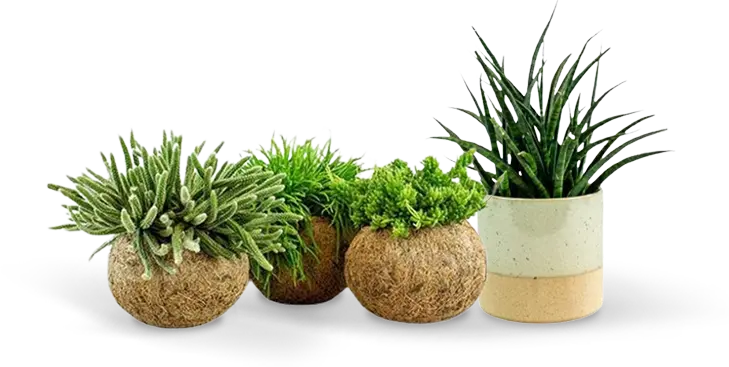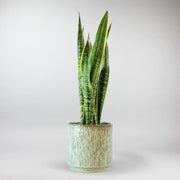Succulent Plants
Why Choose Succulents?
Succulent plants are famous for their ability to store water in their fleshy leaves, stems, or roots, making them incredibly low-maintenance and drought-tolerant. Ideal for busy individuals or those new to plant care, succulents thrive with minimal effort, making them a stress-free addition to your space. Their ability to purify air and add visual appeal further enhances their popularity.
Caring for Succulents
Succulents thrive in bright, indirect sunlight and prefer well-draining soil. Water sparingly—only when the soil is dry to the touch. With a little love, these plants will flourish and bring beauty for years to come.
Succulent Plants FAQ
How Do You Propagate Succulents?
Dividing
Some succulents will have baby plants grow beside them. You can divide these by separating them gently, taking the small root system attached then replanting wherever you want them to be. These are called plantlets or offsets and some succulents drop them like seeds which take root where they land.
Root Separation
Dig the plant up gently and separate it by the roots into clumps by gently pulling them apart. These separated parts are ready to plant right away.
Using Cuttings
Remove some leaves and dry them out in a tray until they form a callus at the cut point. This should take around five days. Place the calloused leaves on some cactus soil and in a few weeks, some little pink roots will grow. Eventually, a baby plant will form and the mother leaf will fall off.
For leggy succulents, chop the whole head off with about an inch of stem attached and wait for the cut to callus. Place this on some cactus soil and in a few weeks it should have started growing some roots and happily continue to grow.
After replanting, leave your new succulent plants for 24 hours before watering.
What kind of Succulent Plants are there?
String of Hearts & Eco Coconut Pot
The String of Hearts is a really pretty succulent plant that looks great hanging from a pot. The heart-shaped leaves hang down like a lovely waterfall. They make perfect gifts too!
Snake Plant Laurentii
With long knife-like leaves, this stunning succulent Snake Plant is really unique and eye-catching. It is very low maintenance and makes a great addition to any office or home.
Cylindrical Snake Plant
The cylindrical fronds of this Snake Plant will have you questioning what planet this succulent came from! It’s definitely something a little bit different and adds some pizazz to your space.
Candelabra Cactus
A cactus that won’t be a thorn in your side, the Candelabra Cactus is low maintenance and seriously cool-looking. Reminiscent of a cartoon cacti, this cactus would look at home in any artist’s house or gallery.
Sedum Makinoi Tornado
A more typical succulent with fleshy leaves, the Sedum Makinoi tornado makes a really nice house plant that’s a little off the beaten track.
Mistletoe Cactus
This hairy-looking friend adds charm and fun to your space without taking up lots of room. It’s super low maintenance, pet friendly and bordering on kill-proof!
Can I Use Any Potting Soil For Succulents?
Succulents need really good drainage, so regular potting soil is not a good choice for them. It is far too good at holding onto moisture which could lead to root and leaf rot.
A better selection for a succulent’s potting mix would either be cactus soil, which is made specifically for these types of plants, or potting soil mixed with perlite, sand or another dry medium. This allows for lots of drainage, much like it would have in its natural habitat.
If you are making your own mix, a good ratio is 3 parts potting soil to 2 parts coarse sand to 1 part perlite.
Do Succulent Plants Like Sun Or Shade?
Most succulents absolutely LOVE the sun and need a solid six hours of direct light every day. This makes them perfect for your windowsill and gardens that get lots of sun during the day.
Each variety is different, so make sure you check their individual care instructions and follow them. However, generally speaking, this rule runs true for most.
If you have succulents in pots, you can put them outside in the warmer months, but make sure they come back in before it reaches freezing temperatures, as they are not made for our chilly and damp weather!
Are Succulents Pet-friendly?
Most succulents are pet safe but there are a few varieties that are toxic or even deadly to animals.
Some examples of Pet-Safe Succulents include: Houseleek, Haworthia and Burro’s Tail.
Succulents that are NOT friendly to dogs and cats include: Aloe vera, Kalanchoe, Euphorbia and Jade.
Before buying a new plant, you should always check if it could be toxic to your furry friends. Luckily, most cats and dogs don’t like to nibble on succulents as they don’t smell or taste very good to them. Phone your vet if you think your pet has swallowed part of a toxic plant.






















